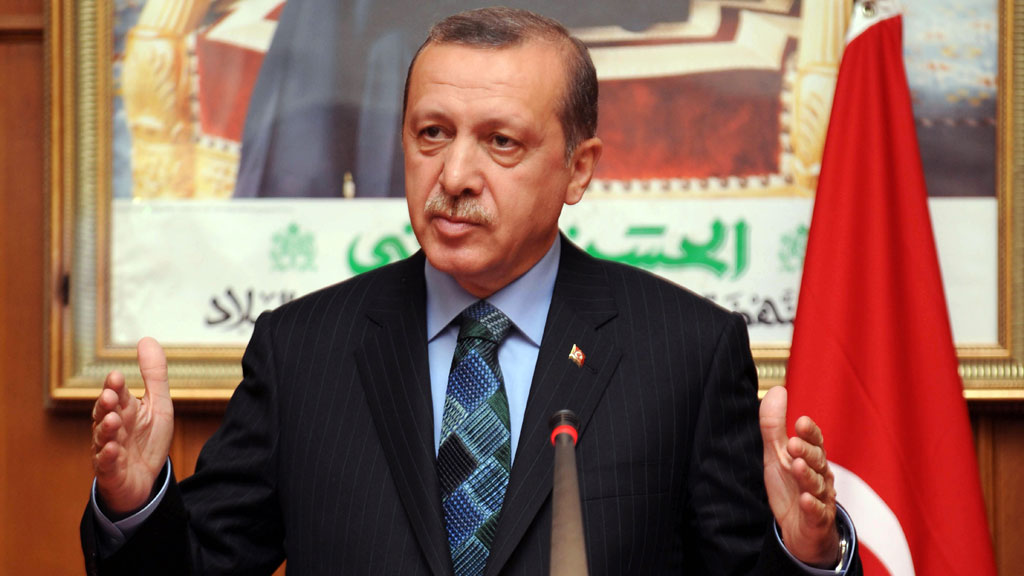‘Sultan’ Erdogan: the end of Turkey’s secular state?
His opponents call him the sultan, and say he is intent on transforming Turkey’s secular state into an Islamic fiefdom. But amid widespread protests, which way will Turkey’s prime minister turn?

What began as a minor protest against urban development in Istanbul has mushroomed into a fully fledged stand-off between police and opponents of Prime Minister Recep Tayyip Erdogan’s rule.
Mr Erdogan himself has dismissed the protestors as a tiny bunch of extremists, bent on causing trouble; but do the violent clashes reveal a widening fault line in Turkey, between the secular middle class and those determined to reinstate the old Ottoman, Islamic ideals?
The protests are centred around Istanbul’s Taksim Square, the secular heart of a largely secular city, filled with cafes, nightclubs and bars. Efforts to build a mosque there sparked an outcry and more fears that the prime minister was continuing to blur the lines between politics and religion.
As Cinar Kuper put it in The Atlantic: “The Europe-facing, Western-dressing, cocktail-toasting modern nation-state…is being replaced by a religiously conservative one, headscarf by headscarf.”
Now the leader who President Obama once called the “model ally” is no longer so alluring to western eyes, while the ripples of unrest spread across an already volatile region.
Headscarf by headscarf
Tayyip Erdogan’s own personal history is just as mixed. He grew up in the tough working class Istanbul district of Kasimpasa, where he was drawn to radical Islamic ideas as a young man.
After a brief spell as a professional footballer, he went into politics, becoming mayor of his city in the mid 1990s. He was generally hailed as a technocrat, a competent manager who modernised the ancient water system, built roads, and brought in environmentally friendly buses.
Foreign Affairs Correspondent Jonathan Rugman used to live in Istanbul. Click here for his take on the protests
He tried, and failed, to knock down the city’s ancient Byzantine walls to make way for a posh waterfront housing development: there was no sentimentality about the past.
But after his Islamist views landed him in prison in 1999, and his Welfare party was banned, he founded the Justice and Development party (AKP), returning to office once a temporary ban was lifted in 2003.
“Democracy is like a train,” he said at the time. “We shall get out when we arrive at the station we want.”
Still, his popularity among the electorate was never in doubt, culminating in a near 50 per cent support in 2011, the closest thing any Turkish politician had got to a mandate for decades.
But the flip side of that mandate was no need for compromise, or any kind of dialogue with his opponents. Sources claimed he surrounded himself by yes-men. There were allegations of nepotism in his governmental appointments, even a cult of personality.
Democracy is like a train. We shall get out when we arrive at the station we want. Tayyip Erdogan
The United States was growing ever more wary of its most important regional ally, as diplomatic cables released by Wikileaks revealed. The Americans were concerned that Mr Erdogan was getting all his information from Islamic leaning papers, rather than his own cabinet officials.
The cables talked of a power hungry leader surrounded by “an iron ring of sycophantic (but contemptuous) advisors”, and a complete lack of trust, which went right to the very top. One authority told the US: “Tayyip believes in God… but doesn’t trust him.”
Hundreds of journalists and intellectuals in Turkey are in detention, more than half of them Kurdish. The prime minister has called on people to boycott newspapers who have been unsympathetic to his aims, while some reporters and commentators who have been critical say they have been intimidated and fear for their safety.
The middle class protestors who are filling the streets represent Turkey’s secular tradition: but the 50 percent who backed Erdogan two years ago are still vocal, such as the shopkeepers and businessmen who have prospered under his rule, who say he has brought money and stability to the country.
Turkish spring?
It is no secret that although Erdogan is banned from seeking another prime ministerial term, he wants to run for the presidency in 2014. Will the current wave of unrest threaten that ambition?
The prime minister and his party have scotched any idea that these protests are anything like the Arab Spring, which has toppled dictators and torn apart the old certainties.
Instead Mr Erdogan has declared his own time in office is a “Turkish spring”. There will be no concessions to those who are demonstrating against him. And as for Taksim square, there are new plans for a mosque, along with an Ottoman-style barracks. A nod to religion and tradition, then, even in this symbol of Turkey’s economic boom.
-
Latest news
-
‘Government responsiveness should be improved’ says infected blood inquiry chair4m

-
Infected Blood scandal: How UK failed on a global scale4m

-
‘There’s a strong evidential basis’ for ICC to grant arrest warrants for Netanyahu, says criminal law expert4m

-
International Criminal Court prosecutor seeks arrest warrants for Israel PM and Hamas leaders3m

-
‘Highly unlikely there was foul play’ in Iran president helicopter crash, says Tehran professor5m

-




